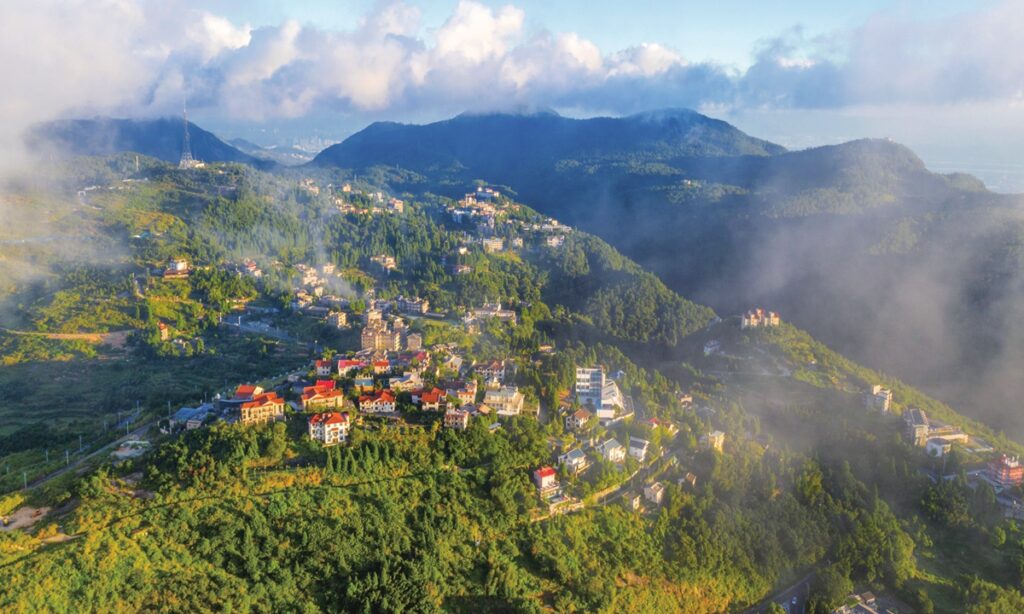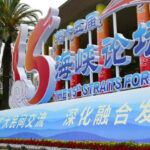Foundation of relations
Chinese President Xi Jinping highly values culture and has a profound understanding of human civilization.
For President Xi, culture plays a unique and irreplaceable role in the rejuvenation of China and the building of a global community of shared future. He speaks from Chinese wisdom, which has been passed down for millennia, advocating for the mutual prosperity of global civilizations, welcoming the flourishing of popular cultural products, and encouraging the youth to join the path to inheriting and reinventing their proud traditions.
This episode focuses on how Xi’s actions have promoted friendly people-to-people exchanges between China and the US, which is a perfect example of facilitating coexistence and mutual learning among civilizations.
The lush cedar trees, the ancient wells, Western-style villas… Kuliang is a pleasant place in the mountains where both young and old Fuzhou residents, natives and foreigners, never want to miss.
But their appreciation for Kuliang goes beyond these elements.
Kuliang, a resort area in the suburbs of Fuzhou, capital city of East China’s Fujian Province, is also a place which was once full of endless flavor of the carefree play between Chinese and American children, witnessing their friendship transcend the limits of time and space. This place has also witnessed generations of insightful people striving to promote friendly exchanges and carry on the most sincere friendship between these two countries.
At the end of June, a group of former Fuzhou residents crossed mountains and oceans to return to this beloved place.
The group “Kuliang Friends” formed by the descendants of American families who once lived in Kuliang as early as a century ago gathered together to participate in the “Bond with Kuliang: 2023 China-US People-to-People Friendship Forum.”
When they arrived in Kuliang, as they got out of the car, a few of them shouted out in fluent Fuzhou dialect, “We’re home!”
At the China-US people-to-people friendship forum, another special former Fuzhou resident sent his blessings and encouragement to these American friends. “I hope that you will continue to write the Kuliang story and carry forward the special bonds, so that the friendship between our two peoples can stay forever strong and robust like the thousand-year-old cedar trees in Kuliang,” Chinese President Xi Jinping said at a congratulatory letter sent to the forum.
Their stories have shown once again that the Chinese and American peoples can transcend differences in system, culture and language, and build profound friendship, said Xi.
How should the two civilizations of China and the US coexist to bring prosperity and stability to their people?
The Chinese leader has always advocated people to people exchanges between countries and civilizations. “The foundation of China-US relations lies in the people. We have always placed our hope on the American people and wish all the best for the friendship between the two peoples,” Xi said, while meeting with Bill Gates, co-chair of the Bill and Melinda Gates Foundation, in Beijing on June 16, 2023.
With the care and reconnection of treasured old friends, there is a sequel to the Kuliang story written by the people of China and the US. They share the firm belief that the relationship between the two countries is full of new opportunities.
Beautiful views remain
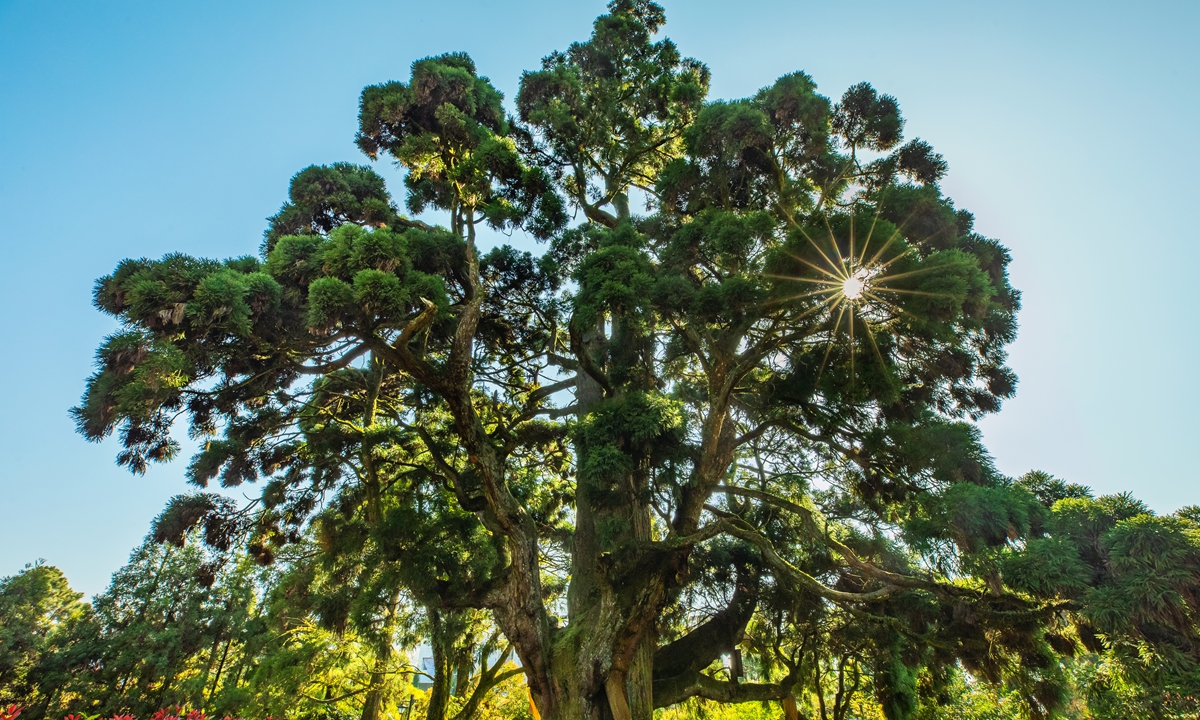
A view of the “king of cedar trees” in Kuliang. Photo: Courtesy of Fuzhou Kuliang tourism resort administrative committee
No matter how many times they visit Kuliang, the “king of cedar trees” is always a must-visit spot for these foreign friends, where two trees embrace each other and have stood for over 1,000 years.
The origin of the Kuliang story comes from this cool shade. In the mid-19th century, a large number of foreigners came to Fuzhou to work and live, many of whom were businessmen, missionaries, and also consular officials. During the summer, many foreigners chose to escape the heat in Kuliang.
At its peak, Kuliang had over 300 Western-style villas, one of which was home to Milton Gardner.
Gardner was born in the US in 1901. As a child, he came to live in Fuzhou with his parents.
Foreigners liked to plant cedar trees in front of their villas, Gardner and some Chinese children living close used to spend their childhood playing together under the trees.
After returning to the US with his family in 1911, Gardner’s greatest wish was to return to his childhood home in China. However, unfortunately, he was never able to fulfill his wish.
In 1992, with the help from Chinese students in the US, Gardner’s wife Elizabeth Gardner finally found out that the place her husband had been dreaming of for his whole life was Kuliang in Fuzhou.
That same year, Xi, secretary of the Communist Party of China Fuzhou Committee at the time, after learning about the story of Gardner, invited Elizabeth Gardner to visit Kuliang and helped her fulfill her husband’s wish.
In 2012, when visiting the US as China’s vice president, Xi shared the Kuliang story with the audience at a welcome luncheon held by American friendly groups. This received a warm response from all sectors from both countries.
On June 26, 2023, a grand donation ceremony was held in Kuliang. Lee Gardner, grandnephew of Milton Gardner, donated a complete family chronicle and related documents from his several visits to Fuzhou.
Elyn MacInnis, 72, a cultural expert from the US, brought three suitcases of her collection from the US to donate to the museum, along with members of three other Kuliang families who also made donations.
MacInnis and her husband Peter’s bond with China date back to her father-in-law Donald MacInnis, who was a member of the Flying Tigers, a group of US volunteer fighter pilots who helped China fight the Japanese troops during World War II. After Donald MacInnis died, Elyn MacInnis and her husband scattered some of his ashes into the Minjiang River, Fuzhou’s “mother river,” as he had requested.
“The place where our ancestors lived and left traces is home, and we are bringing old objects home this time,” Elyn MacInnis told the Global Times.
“When I tell my family and friends about Kuliang, I tell them about the house we lived in on the side of the mountain and the whispering pines, the wide slippery rock beside it where we would play, and the green rice fields… They want to experience China also,” Priscilla Brewster Gill, another Kuliang Friends, told the Global Times.
This time in Fuzhou, Gill, and her granddaughter Katy Barber fulfilled their dream of experiencing a new version of the charm of Kuliang. Gill was born in Fuzhou in 1936, and her father Harold Brewster was the last foreign president of the current Fuzhou Medical University Union Hospital.
As she came to Fuzhou once again, Gill said that she was amazed by the changes in the city: the beautiful parks in the city and along the river, the magnificent Naval History Museum, the cleanliness, the vast amount of greenery, the carefully restored old buildings, the wide roads and highways, the lovely gardens, “and the state of the art Union Hospital where many years ago my father was surgeon and Medical Superintendent. There is so much to admire!” She said.
In Kuliang, Barber walked with Gill to a well, where the words “Foreign and Local Public Well” were inscribed.
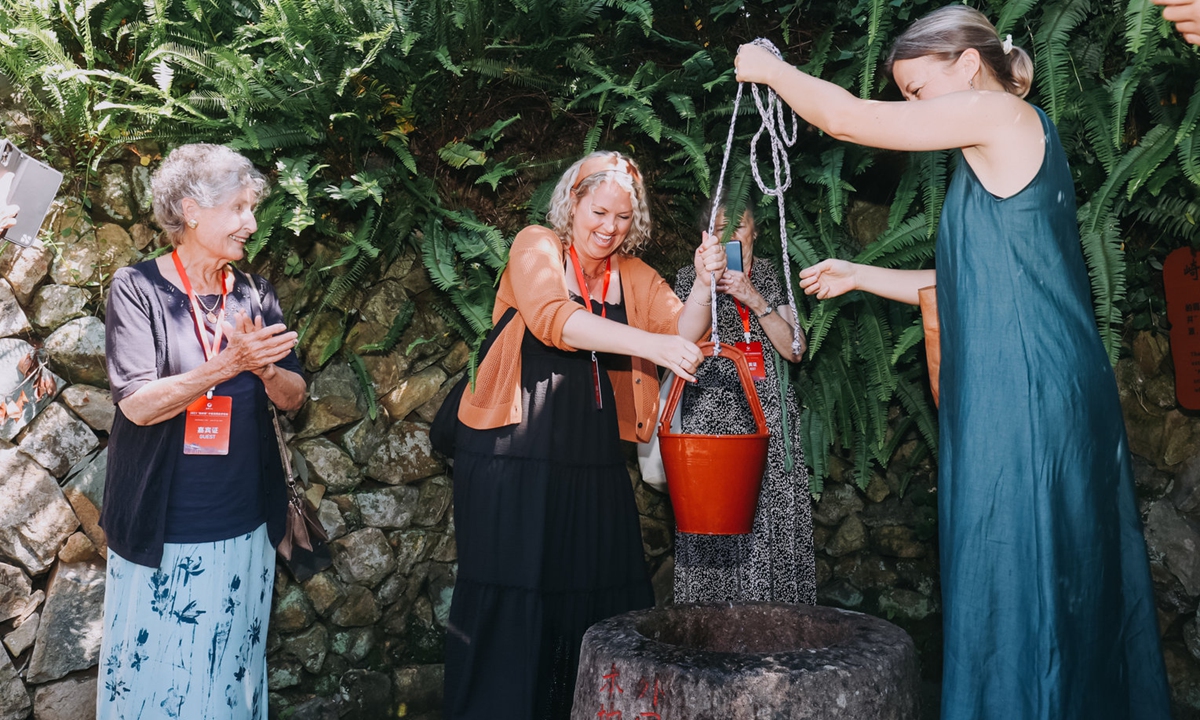
Priscilla Brewster Gill (left) watches her granddaughter Katy Barber (center) use a bucket to draw water from an old well on June 28, 2023. Photo: Courtesy of Fuzhou Kuliang tourism resort administrative committee
“At that time, public facilities such as hospitals, post offices and photo studios in Kuliang were funded and built by foreigners, and the local residents of Kuliang were also happy to share this important resource of well water to us,” Gill said.
Barber had heard the story of the well countless times, in Kuliang, she imitated her grandmother’s actions, drawing a bucket of clear water.
“The beautiful views remain,” Gill said of Kuliang. Now, back at Rhode Island, she has a new and wonderful memory. “I am touched by my experience there last week with the welcoming people, and the great care with which I was treated. They are symbols and pictures showing great thought and effort and giving me a wonderful opportunity to display the spirit of friendship between our peoples.”
Expanding friends circle
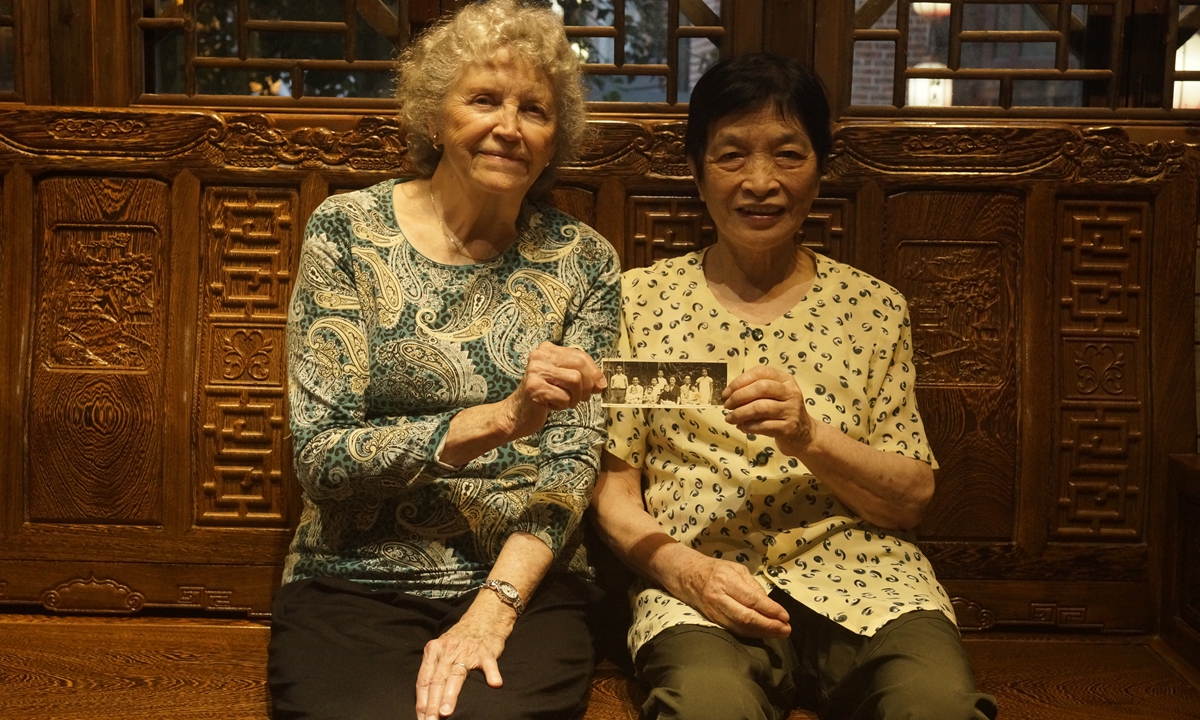
On June 24, 2023, Gail Harris and Li Yiying sit next to each other after their reunion, holding an old photo of them as babies sitting on their parents’ laps. Photo: Lin Yinan
The ever-richer picture of life in Kuliang was made possible by generations of continued efforts.
In the past, Elizabeth Gardner traveled all over China looking for a place called Kuliang until she finally located the place in Fuzhou.
Our family is very grateful to President Xi for helping to fulfill the wishes of an elderly American he never even knew, whose actions have touched and inspired many people, said Lee Gardner.
In 2016, Elyn MacInnis and her like-minded partner Professor Lin Yinan, an expert in Kuliang culture at East China University of Science and Technology, formed a multinational research team. They conducted on-site surveys of old buildings in Kuliang, searched through archival materials at various universities, including the Yale and Harvard University libraries. Elyn MacInnis established a website so they could locate the descendants of foreign families who lived in Kuliang; Lin and his students built a platform which could use the AI technology to identify the people from historic photos.
“Reunions are always a chance to share memories and in the process, strengthen friendships and ancient ties,” Gail Harris, granddaughter of Harry Russell Caldwell, a missionary known for managing and building schools in China, told the Global Times.
In Fuzhou, Harris met her “twin sister” Li Yiying again.
“In this photo, they were still babies,” Lin said, as he showed an old photo to the Global Times reporters, in which he discovered this pair of “twins.”
In 1941, Harris was born in Yangkou, Nanping and a friend of her parents’ had a daughter who was born in the same day, which also happened to be the 60th anniversary of the founding of Anglo-Chinese (Ying-Hua) College of Fuzhou, the predecessor of Affiliated High School of Fujian Normal University, where they worked. In order to commemorate this special fate, the parents named their respective daughters “Li Yiying” and “Bi Lehua,” splitting the school’s Chinese name Ying-Hua.
On June 24, 2023, under Lin’s arrangement, the two 82-year-olds were reunited in Fuzhou. Li didn’t speak English and Harris could only speak a few words of Fuzhou dialect. However, once they met, they sat down together and held hands as if they never wanted to let go.
Currently, we have a team which consists of Americans and Chinese academics as well as local villagers that have come together in friendship, regardless of nationality, to study Kuliang culture and history, Elyn MacInnis noted.
With a lot of hard work, they brought together and reunited real people, like putting together the pieces of a puzzle.
Thanks to their joint efforts, they have collected more than 1,000 pieces of written and oral materials, pictures and objects related to the story of Kuliang.
Today, more young people have been involved in this drive. Lin noted that most of the members of Lin’s research team are his students, who come from all over China. “They all have a passion for studying Kuliang culture and exploring China-US friendship. On June 28, when Harris left Fuzhou for the US, my students were in tears,” Lin said.
The 39-year-old Barber, now living in San Francisco and working as a primary school teacher, introduces students to the geography and culture of China, such as the Chinese people’s traditions and cuisines.
From the US, she told the Global Times that “everyone loves to see my pictures and hear about the people there [in Fuzhou].”
She believes while storytelling is important, there is nothing quite like experiencing something first hand. In the near future, she plans to invite more members of her family as well as friends to this land full of love and hope.
Amity between peoples the key
The story of Kuliang is a resemblance of how the two civilizations of China and the US should coexist to benefit their people. It is not just a Chinese story or an American story, but a story belonging to all of humanity, the American families said in unison.
Elyn MacInnis has eloquently described the “Spirit of Kuliang” as Love, Peace, Friendship, Sensitivity and Respect, which received the full approval of the “Kuliang Friends.”
“I very much agree with her, because those qualities are my own memories of living in Kuliang since childhood. As an adult, I have come to understand that those qualities transcend politics,” said Harris.
Lin believes that the “Spirit of Kuliang” proves that friendship between people on Earth can overcome all kinds of barriers such as language, culture and ideology. “This is because peace and friendship is what everyone needs. It doesn’t deteriorate, it doesn’t change, but it gets stronger over time. And it is universal, showing the Chinese people’s hospitality. As always they embrace these, perhaps, unfamiliar faces, with open arms,” he said.
Zhang Yiwu, a professor on Chinese language and literature at Peking University, told the Global Times that the beautiful Kuliang story about the China-US people’s friendly relationship that has been passed down generations for over a century shows that the US government’s current hostile attitude toward China has no benefit to the countries’ shared future.
The Kuliang story has become a cultural symbol as well as a spiritual heritage between China and the US, and it conveys the values that only mutual respect and frequent friendly exchanges can lead to a better development, Zhang said.
In the face of the current cloud over the China-US relationship, the American people are also worried. “I am always sad that political differences often override the profound friendships among people,” Harris told the Global Times.
However, unlike Western politicians’ hyping of the differences between the two countries, “China and the US have had friendship for so many years, and that both countries want the same things for their people was something I learned at the Forum. We have such a deep bond with the people and the place that we want to keep it a part of our lives,” said Gill.
“We couldn’t agree more with President Xi’s vision that amity between peoples holds the key to the relationship between countries and the people are the cornerstone of its growth,” she said.
Meaningful people-to-people exchanges are essential and should not be interrupted by prejudice and arrogance, Zheng Changling, secretary general of the China Folk Culture Innovation and Development Center, told the Global Times.
The Chinese nation is a peace-loving nation, as proven by numerous historical records and archaeological facts. Countless developments in real life demonstrate our unwavering commitment to this principle, Zheng noted.
Zheng pointed out that President Xi’s deep understanding of people-to-people interactions is very insightful and attaches great importance to exchanges between civilizations. “This not only provides a top-level blueprint for the great rejuvenation of the Chinese nation but also contributes Chinese wisdom and proposals to the future development of human society including the Global Civilization Initiative,” he said.
Harris said that she prefers the vision of a shared future for mankind over politics before people.
“The fate of our planet really does depend on good-will and cooperation. I would like to see more Americans visit China and learn firsthand about the great generosity, warmth and friendliness of the Chinese people. And I look forward to extending my own hospitality to my Chinese friends,” Harris said.
(Global Times)

